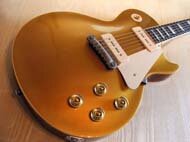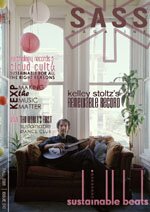

Sex, Drugs and...Sustainable, Environmentally and Socially Conscious Rock N' Roll?
As a rock n' roll musician who’s been in bands for longer than I'd like to admit, I am often at odds with how to reconcile being an advocate for sustainability while maintaining that all important "bad-boy" rocker image. In an industry that's infamous for indulging in the excesses of "the rock 'n roll lifestyle", is it possible to remain true to the sustainability cause? -- by Patrick Napper
 Making the sustainable choices in all other aspects of my life is a no-brainer but when it comes to my music, I find it to be much more challenging. When I look around my industry for shining examples I come up with very few; Bono, Eddie Vedder, Chris Martin and Neil Young are some of the more notable big names. What we might need is to redefine what it is to be a rockstar in this fledgling millennium. Rather than just some well-coifed axe-slinger who dates Playboy models and needs both hands to count the number of times they've been in and out of rehab and/or jail, how about someone who uses their music and star power to promote a message of sustainability that ultimately influences millions of fans and helps save the world as well? Maybe a happy medium between the two is reasonable to strive for. Besides, after we save the world the tabloids will still need something to write about.
Making the sustainable choices in all other aspects of my life is a no-brainer but when it comes to my music, I find it to be much more challenging. When I look around my industry for shining examples I come up with very few; Bono, Eddie Vedder, Chris Martin and Neil Young are some of the more notable big names. What we might need is to redefine what it is to be a rockstar in this fledgling millennium. Rather than just some well-coifed axe-slinger who dates Playboy models and needs both hands to count the number of times they've been in and out of rehab and/or jail, how about someone who uses their music and star power to promote a message of sustainability that ultimately influences millions of fans and helps save the world as well? Maybe a happy medium between the two is reasonable to strive for. Besides, after we save the world the tabloids will still need something to write about.
Being in a rock n' roll band that has not "made it" yet, I am constantly challenged to find cost effective ways to spread our music while being as sustainable as possible. This relates to many areas including CD packaging, show flyers, music gear, tour vehicles, just to name a few. Here are a few ways that I've come across along the way:
CD packaging | Although the music industry has been shifting greatly towards downloading mp3's, the CD is still a powerful tool for new bands to get there music out there. It is still possible to produce a great looking CD package that is also sustainable and affordable. DiscMakers is one of the largest CD and DVD manufacturers in the country. They offer a package they call the "Eco-wallet". Made entirely of 100% recyclable paperboard, Eco-wallets make a lightweight and environmentally friendly alternative to the plastic jewel case, and DiscMakers makes these available for quantities as small as 500. You can choose a 100% recyclable high-gloss UV coating or matte coating with full color printing and 3 color on-disc printing. 1,000 CDs go for $1,590, or $1.59 a disc -- not bad. You can afford to give some of these away and still make your money back. Check out www.discmakers.com/music/ecowallet for more info. (Editor's note: Two others worth looking at are Earthology Records and Groove House Records. See our interview with Earthology founder Craig Minowa for more details.)
Promotional materials | Besides blasting all your friends on myspace about your upcoming shows, flyers and hand-bills are still a great promotional tool. At Kinko's and many other print shops around you can ask that your flyers are printed on recycled paper. Some print shops even offer soy ink, which takes a little more looking. Any leftover hand-bills and posters that you left at all the clubs, record stores and coffee shops around town can be picked up after the show and recycled and/or replaced with the next shows' flyers. How about adding a "Please Recycle" icon on your flyers somewhere?
 Music gear | Rather than walking into Guitar Center, the Wal-mart of music gear, for your next major equipment purchase, check out your options on previously owned gear. I know Guitar Center will beat anybody's price but think of the satisfaction you'll have when you hunt down a great deal on some vintage guitar or piece of gear that's in mint condition, and besides that, sounds better than anything made today. Craiglist, eBay, and your local used instrument shops are a great place to start. If you do your homework and keep your eyes peeled, there are great deals on great gear right under your nose!
Music gear | Rather than walking into Guitar Center, the Wal-mart of music gear, for your next major equipment purchase, check out your options on previously owned gear. I know Guitar Center will beat anybody's price but think of the satisfaction you'll have when you hunt down a great deal on some vintage guitar or piece of gear that's in mint condition, and besides that, sounds better than anything made today. Craiglist, eBay, and your local used instrument shops are a great place to start. If you do your homework and keep your eyes peeled, there are great deals on great gear right under your nose!
Touring | For the likes of Dave Mathews or Neil Young, it's a little more feasible to run your tour buses on biodiesel than for your average up-and-coming bands. However, buying or renting a diesel van for your next DIY tour means you have the opportunity to take advantage of biodiesel. With filling stations popping up all across the country, (there are approximately 1,500 distributors, 600 filling stations and 35 biodiesel plants, with the highest concentration of stations nestled within the central United States -- here's a map), the idea of a biodeisel fueled tour for the DIY artist is not that far fetched anymore. Currently, biodiesel is still a tad expensive than petroleum-based diesel, but by creating more demand you can help drive down the price.
Making your tour "carbon neutral" is another way to go. In an effort to mitigate their own carbon emissions while raising the public's carbon consciousness, Pearl Jam launched their own 2006 "Carbon Portfolio Strategy". Through this strategy, the band will donate a total of $100,000 to nine organizations doing innovative work around climate change, renewable energy and the environment. Bands on a slightly smaller budget can still follow Pearl Jam's lead by donating any amount within their budget to help offset the carbon emissions generated from their tour. In addition to the Carbon Portfolio Strategy, Pearl Jam are working to offset carbon emissions from their 2006 US tour by using B100 -- 100% biodiesel -- in all production trucks and tour buses. B100 reduces emissions of carbon monoxide by approximately 50% and carbon dioxide by 78% on a net lifecycle basis. In contrast to fossil fuels, which release new carbon previously sequestered in the earth's crust, the carbon in B100 emissions is recycled from carbon already present in the atmosphere.
In closing, I would like to challenge all the young, up and coming bands out there to think outside the box. Set an example by coming up with new and innovative ways to rock the music industry with sustainability. If you are already doing great things out there and making a difference please let us know. We want to recognize you and highlight what you are doing so others can pick up the tip. Remember, you can be totally sustainable without giving up any of the rock!
Patrick Napper is a musician and sustainability enthusiast in Seattle. He rocks with Omnivoid, a Seattle-based band, and sits on the Board of Directors for Sustainable Style Foundation. He eats all colors of M&M's and wants to remind musicians everywhere that if they have to smash their guitars on stage, at least donate the pieces to charity.
















